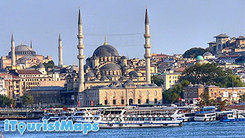Turkey
History. The country’s history reaches back to the beginnings of civilization, but the Republic of Turkey that the traveller sees today dates from 1923, when the visionary leader Kemal Atat?rk decided that his country’s best chance of future stability and prosperity lays in modernization, preserving the best traditions of imperial past, while looking increasingly towards the industrialized west as a model of development. His programs of reform included the secularization of government, the emancipation of women, the replacement of the Arabic script with a Latinized alphabet, and so on. Turkey nowadays. Turkey is rapidly increasing in popularity as a holiday destination. The growth of tourism over past few years has been phenomenal. What is it that is making Turkey so popular? The attractions are many. The climate of the coast is typically Mediterranean, with hot, sunny summers, and warm, clean water that make the area a water sports paradise. The beaches are always clean and exceptional. The major resorts are sophisticated and cosmopolitan - in places like Bodrum and Marmaris you can sub shoulders with the jet set and dance the night in Western style night clubs - and yet, only a few miles away you can find villages with the way of life that is typically Turkish, where the day begins at dawn with the muezzin’s call to prayer. Food. Speaking of Turkish food, it is simply delicious. Forget the "Turkish" kebabs you may have tasted back home; these offerings cannot compare with the real thing, freshly grilled over charcoal and served with tomato sauce, browned butter, yogurt and a glass of ayran. And kebabs are only one delectable dish amongmany: Turkish cuisine is rated highly by gourmets. Tips. Restaurant and hotel bills usually include a service charge, but it is customary to tip the waiter around 5%. Tipping taxi drivers is not customary, but it is usual to round up the fare. In a Turkish bath it is normal to tip about 30% between the various members of stuff. But if someone refuses a tip - don’t force on them, as this might offend. Native people. But Turkey’s greatest asset is its people of course. The Turks are open, friendly and remarkably hospitable. They are proud of their country, and welcome visitors who take an interest in it. Although 99% of the population is Muslim, with an outlook very different from the one western people have got used to, natives are very tolerant and understanding to western ways. Most of the people you will meet in hotels, restaurants and shops will be able to speak at least some English; in the countryside English speakers are fewer in number, but you can easily get by with smiles and sign language. Traveling. Companies offer priced package holidays to the resorts on Turkey’s Aegean and Mediterranean coasts. Travellers interested in sightseeing would do well to consider a "fly-drive" package; a car gives you freedom to explore away from the beaten track, and is the ideal way to get the most out of the trip. For those who want something a little different, there is the famous "Blue Voyage": one or two weeks spent aboard a skippered Turkish yacht, cruising the stunningly beautiful coastline between Bodrum and Antalya. For the independent traveller too, Turkey makes an attractive destination. Getting around the public transport is easy and cheap. Rent a car. As it was already said driving a car is an excellent way of seeing more of the region. There are rental agencies in all main towns. Driving is on the right side, seat belts are compulsory and speed limits are 50 kph in built-up areas, 90 kph elsewhere. The blood alcohol limit for driving is zero. Regulations and road signs are similar to the rest of Europe. Some important Turkish words you will see on road signs: yavaz - slow; dur - stop; dikkat - caution; centrum or sehirmerkezi - town centre. Main roads are generally in good condition, and driving is quite pleasant outside cities and large towns. Accomodation. Accommodation ranges from cheap family-run pensions which can be found just about anywhere, to top-class luxury hotels, confined to major cities like Izmir and Antalya. Most of the accommodation in the region is in pensions (Pansiyon in Turkish), self-catering apartments and middle-range hotels. The best approach is simply to choose a hotel or pension that catches your eye, and ask to see the room before you decide. Turkey is a large country - from Istanbul to Mediterranean coast is around 1000 km - and in the space of two weeks the traveller can expect to see only a small part of it. But it is such a beautiful and enjoyable county that you will probably want to return again and again. Do so; after a few visits you will probably come to love the place as much as the Turks do themselves. |

Turkey on map |
||||
List of cities in Turkey |
|||||
|
Copyright © iTouristMaps, 2015-2024. All rights belong to their respective owners. Contacts |



